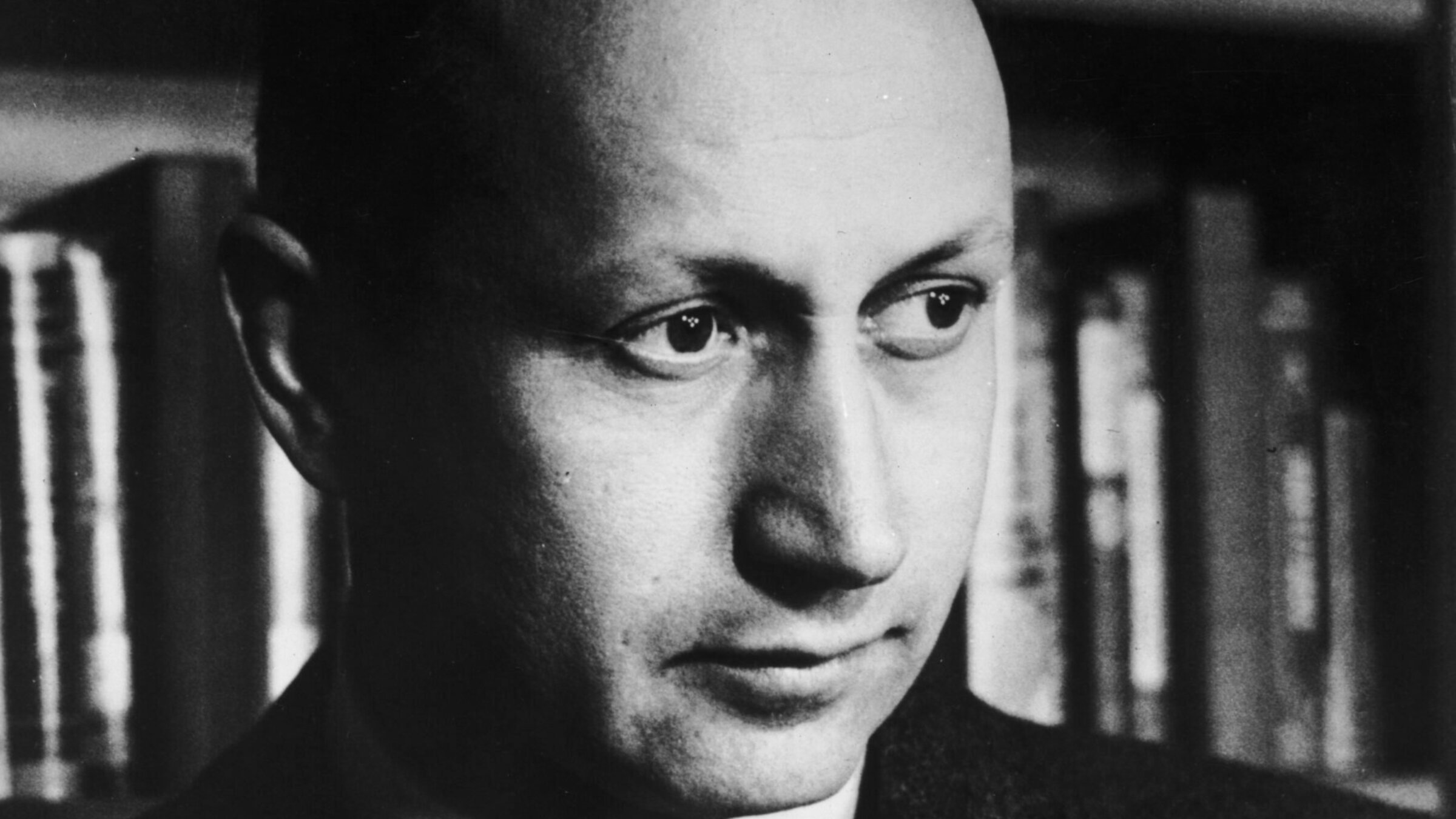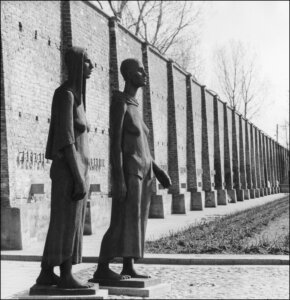One of our greatest peacemakers didn’t speak about his Jewishness; he didn’t have to
In speaking out against Nazism and nuclear war, Norman Cousins was both humanitarian and prophet

Norman Cousins, editor of the Saturday Review, in 1963. Photo by Getty Images
Norman Cousins: Peacemaker in the Atomic Age
By Allen Pietrobon
Johns Hopkins University Press, 440 pages, $35
I always knew that the progressive journalist and tireless anti-nuclear peace activist Norman Cousins was a mensch, his sensibility apparent from the now defunct Saturday Review, the cultural and political journal he edited for decades — and that I read avidly starting when I was growing up in the 1960s and on through the mid-1970s.
The newly published biography Norman Cousins: Peacemaker in the Atomic Age by scholar Allen Pietrobon confirms the immensity of his humanitarian spirit and influence as a self-appointed secular anti-nuclear prophet. From the moment he learned that the first atomic bomb had dropped on Hiroshima on Aug. 6, 1945, he raised the alarm against the threat of nuclear holocaust, immediately divining the existential threat nuclear weapons posed. (“Modern Man Is Obsolete,” he declared in an editorial, and then a book, that was read around the world.)
He soon joined forces with the atomic physicist Leo Szilard (the Jewish refugee from Nazism who had authored the 1939 letter signed by Albert Einstein that convinced President Franklin D. Roosevelt to initiate the Manhattan Project and build an atomic bomb before Hitler could) to help establish the Bulletin of the Atomic Scientists, an organization today best known for its constantly ticking Doomsday Clock.

In 1955, Cousins rallied support and funding that would allow the “Hiroshima Maidens” — 25 women whom the atomic blast had horrifically disfigured when they were girls — to come to the United States for advanced medical treatment. Three years later, he brought attention to the plight of the “Ravensbruck Rabbits,” a group of Catholic Polish women whom the Gestapo had sentenced to the notorious all-women’s concentration camp Ravensbruck for their anti-Nazi Resistance work and who were then relegated to serve as human guinea pigs (or “rabbits”) for horrendous Nazi medical experiments. The women had survived, but were in dire need of medical treatment and rehabilitation; Cousins led the campaign to allow them entry to the U.S., where they received the care they required.
For Cousins, the Saturday Review was his weekly pulpit. Throughout the Cold War his editorials preached an ecumenical doctrine of conciliation and diplomacy. He met and consulted with a long list of world leaders, including Kennedy, Khrushchev and the pope; their talks helped to defuse international arms tensions, and promoted nuclear treaty initiatives to limit testing and stockpiling.
When the Saturday Review ceased publication, though, he was still not finished. In the 1970s, after he overcame life-threatening illness through a novel mix of humor and laughter, he spread the word around the world of the healing wisdom of the body. His 1979 book Anatomy of an Illness as Perceived by the Patient: Reflections on Healing and Regeneration (which I reviewed for my hometown paper, The Baltimore Sun) was one of the first books to seriously address the importance of the mind-body connection in combating disease.
In all these ways, Cousins demonstrated the moral seriousness of a saint while never displaying a trace of any particular religion’s ritual doctrine or agenda.
Where had this universalist, non-denominational stance come from?
“Cousins was Jewish by birth but had been raised in a non-practicing secular family,” Pietrobon writes. “While he claimed that he valued his religious heritage, he never publicly self-identified as Jewish. From a young age he was implored by his mother not to present himself in public as Jewish. His parents had suffered from the rampant antisemitism of prewar Europe before emigrating, and they had experienced traces of the same in New York City. To protect her son, she instructed him to hide his Jewish identity and instead celebrate Christmas.”
Pietrobon spends little time on this personal history. But I can’t help but wonder if this buried heritage holds the key to understanding his zeal to save the world from nuclear holocaust as a form of tikkun olam, the Jewish concept of repairing the world. He wrote compassionately about the Nazi Holocaust of 6 million Jews, but the holocaust that riveted his attention was that of universal nuclear annihilation. His life purpose was not only to repair the damage the war had left, but to deter future damage so catastrophic that it could never be repaired.
Cousins did indeed celebrate Christmas, as a secular holiday, but there is no evidence that he ever rejected Judaism. In 1939 he married Eleanor Kopf, who had grown up in Utah as the child of Jewish immigrant parents and had then moved to New York to work for the Newspaper Guild. The simple ceremony took place in the rabbi’s study of New York’s Temple Emanu-El. They raised five daughters; the youngest, Sarah Shapiro, became a noted Orthodox writer who has lived in Jerusalem for decades.
In 1940, he joined the staff of Saturday Review, becoming its chief editor in 1942. “If my convictions were worth anything, I should have been in Germany, taking my chances with the others on the firing line against Nazism,” he wrote. “I felt guilty because so much of my anti-Nazism had been just talk.” Classified as not healthy enough for active military service, he spent the war years working for the Office of War Information, editing pro-democracy propaganda pamphlets that were air-dropped over Nazi territory.
He also favored mass aerial bombing of Germany. “If Germany dislikes these bombings, if she would prefer that we cease and desist, she has only to tell us that she has had enough,” he wrote.
When critics later noted that this position directly contradicted his condemnation of the atomic bombing of Hiroshima, Pietrobon writes, “Cousins would counter that he had supported the bombing of German cities because he saw it as the quickest way to bring an end to Nazi barbarism.”
For Cousins, more critical was the sheer scale of mass destruction and massacre of life unleashed by the release of a single atomic bomb. Cousins described the personal turmoil into which the Hiroshima attack thrust his very sense of being in words that sound nothing if not biblical: Humanity, he felt, had “fixed a sword with the point over his heart, and he was stumbling around in a darkened arena full of pits, holes, and knee-high obstacles.”
In “An Apology for Living,” one of four articles Cousins wrote for Saturday Review about what he witnessed in Germany in 1948, he recounts his visit to a displaced persons camp, where he enters a newly built synagogue and meets Jewish survivors of all ages. A six-year-old shows him tattoos on her arm and leg from four different concentration camps. Ironically, they could be used to trace her identity — and the parents and other family members who were killed. This is her “good,” fortune, she feels, compared to other young children who possessed neither tattoos nor memories as clues to discover their pre-war names and identities. A rabbi whose wife and young son were gassed tells him that, like many survivors, he feels guilty to be alive, saying, “We have to apologize for living.” And yet, the rabbi goes on to say, “life starts up again.”
In another article in the series, “Dinner for 26 in Berlin,” Cousins wrote of scrounging for enough food to feed his guests in the “shattered, smashed city, its insides hollowed out by dynamite and fire.” Speaking with a group of graduate students in their mid-20s, Cousins is astonished when several at the table deny having known anything about Hitler’s military or political “outrages” until after the war. Cousins pointedly asks if they had been “looking the other way when Catholic and Jewish churches had been desecrated, and when Jewish shop windows had been smashed and the stores confiscated and turned over to Nazis.”
Did any of them feel a sense of personal responsibility or guilt for having stood by, saying nothing, Cousins asks. No, one of the men who had served in the military answers; responsibility meant following orders.
“Were we victims of Nazism?” another Nazi military veteran counters. “Nonsense; we made Nazism possible. We didn’t have to go in for persecution or the other unpleasant things ourselves. We could leave the dirty work to others … We were all cowards.”
In none of these articles does Cousins mention his own Jewish roots. He wasn’t hiding them; he simply had no need to reveal them. The articles spoke for themselves.
Nor, in his forays into holistic medicine, did he ever connect his self-styled humor therapy to anything having to do with Jewish humor, beyond his fondness for the absurdist wit of the Marx Brothers. Yet I can’t help thinking that by laughing, no matter what fatal diagnosis he had received, Cousins was also turning on its head the Yiddish proverb, “Man plans. God laughs.” Because only by all of us laughing together could we begin to heal the wounds, old and new, of the human comedy — and tragedy — in which we all play a part.





















